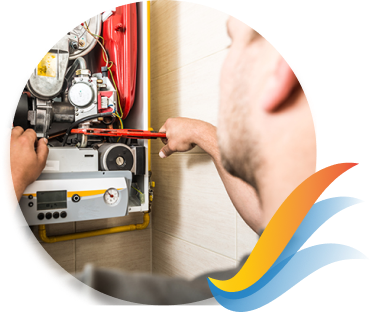You can add value to your home with a new boiler installation in Firestone, CO. New boilers are rich with innovative features, including enhanced efficiency, convenience, and safety. They also provide whisper-quiet performance and do not dry out your home like other heating methods. If your boiler is noisy, costly to run, and nearing the end of its lifespan, My Guy Heating and Air, LLC can help. We install high-quality boilers from trusted brands. We’re also a top choice for boiler repair service and ongoing boiler maintenance. With our help, you can enjoy lower heating costs and optimum home comfort.
Boiler Services in Longmont and Firestone, CO
$50 Off Repair Over $300
Call For More Details

Firestone Boiler Installation Service
The average lifespan of boilers is 10 to 20 years. Gas-fired boilers typically last around 15 years due to the high stress and significant wear of gas combustion. Electric boilers last longer but can be more expensive to operate due to the higher utility costs. No matter what type you have, if your heater has supplied two decades of service, it’s time for a new boiler installation.
If you have a relatively new system with minor issues, boiler repair is an excellent option. Minor problems may include small leaks, increased noise, or strange smells. With professional boiler service, seasoned HVAC technicians can help you decide between boiler replacement and boiler repair. No matter what recommendation you receive, timely boiler service will reduce the risk of fires, gas leaks, and other hazards.
In most cases, large and recurring leaks, insufficient heating, and widespread corrosion mean that boilers have reached the end of their lifespans. This is especially true when these issues are accompanied by advanced age, rising energy bills, and frequent breakdowns. As a general rule, professionals recommend a new boiler installation whenever cumulative boiler repair costs exceed half the cost of replacement.
- Higher-quality materials
- Condensing technologies
- Electronic ignition systems
- Low-nitrogen oxide (Low-NOx) burners
- Integrative smart technologies
New boiler materials are longer-lasting and more resistant to corrosion. This allows for longer lifespans and lower repair costs over time. On the other hand, condensing technologies reduce energy loss in gas boilers by as much as 10%. A boiler with a condensing heat recovery system will also produce fewer harmful emissions, lowering your home’s carbon footprint. Low-NOx burners provide similar benefits. They reduce nitrogen oxide emissions with tightly controlled combustion.
Many older boilers have gas pilot lights, which burn fuel continuously. They can also blow out easily due to nearby drafts. Pilot lights also pose a gas-leak risk, particularly if a homeowner skips annual maintenance. In comparison, electronic ignition systems only use energy at startup. They don’t pose the threat of gas leaks, and homeowners don’t have to relight them.
With integrative smart technologies, you can control your boiler from your mobile phone or laptop. App-based controls add a new level of convenience to boiler heating. It also gives homeowners more insight into their energy use and allows them to monitor boiler safety and performance. Best of all, you can seamlessly pair a smart boiler with your other smart home features.
Schedule Boiler Repair Service Today
At My Guy Heating and Air, LLC, we’ve built our brand on trustworthiness, reliability, and integrity. You can count on us for honest recommendations, transparent pricing, and excellent value. We take pride in our work, and we confidently stand behind our results with solid guarantees. We are a Better Business Bureau (BBB)-accredited HVAC company, and we maintain an excellent rating that we’re proud of.
For boiler replacements, we offer financing on approved credit. We also help homeowners curb the costs of ongoing boiler maintenance with our affordable VIP Membership Plan. Our hassle-free online scheduling, friendly technicians, and superior workmanship make us a popular choice for boiler services in Firestone.
To schedule expert repairs or a boiler installation in Firestone, contact us at My Guy Heating and Air, LLC today!



